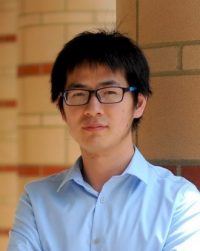Magnetic Memory with Topological Insulators and Ferrimagnetic Insulators

Speaker: Qiming Shao
Affiliation: UCLA Ph.D. Candidate
Abstract: Ubiquitous smart devices and internet of things create tremendous data every day, shifting computing diagram towards data-driven. Computing and memory units in traditional computers are physically separated, which leads to huge energy cost and time delay. Novel computer architectures bring computing and memory units together for data-intensive applications. These memory units need to be fast, energy efficient, scalable and nonvolatile. My research concerns innovating new types of magnetic memory or spintronic devices to achieve ultrahigh energy efficiency and ultracompact size from a perspective of material and heterostructure design. Especially, we employ quantum materials to enable potentially unprecedented technological advances.
The highest energy efficiency of magnetic memory requires the largest charge-to-spin conversion efficiency that allows the minimum power to manipulate the magnetization. We utilize topological surface states of topological insulators (TIs), which have unique spin-momentum locking and thus are 100% spin-polarized. We discover giant spin-orbit torques from TIs, which are more than one order of magnitude larger than those of traditional heavy metals. We integrate TIs into room temperature magnetic memories, which promises future ultralow power dissipation.
To have the best scaling performance, we investigate emerging topological skyrmions in magnetic thin films, which are arguably the smallest spin texture in nature. While most of the skyrmions are discovered in metallic systems, insulating skyrmions are desired thanks to their lower damping and thus potentially lower power dissipation. We create first room temperature stable skyrmions in magnetic insulators by engineering heterostructures consisting of heavy metals and magnetic insulators. This new platform is essential for exploring fundamental magnon-skyrmion physics and pursuing practical applications based on insulating skyrmions.
Biography: Qiming Shao is currently a Ph.D. candidate in the Electrical and Computer Engineering Department at UCLA. He received his Bachelor’s degree in 2013 from Tsinghua University and his Master’s degree in 2015 from UCLA. His main research interest is spintronic devices, and he has 23 publications in peer-reviewed journals and conferences. Qiming is a recipient of 2018-2019 UCLA Dissertation Year Fellowship, two Best Poster Awards at 2018 International Conference on Magnetism, 2015 Qualcomm Innovation Fellowship finalist, and 2012 Tsinghua-Changhong Scholarship for Comprehensive Excellence.
For more information, contact Prof. Kang L. Wang (wang@ee.ucla.edu)
Date/Time:
Date(s) - Mar 15, 2019
2:00 pm - 4:00 pm
Location:
E-IV Maxwell Room #57-124
420 Westwood Plaza - 5th Flr. , Los Angeles CA 90095
